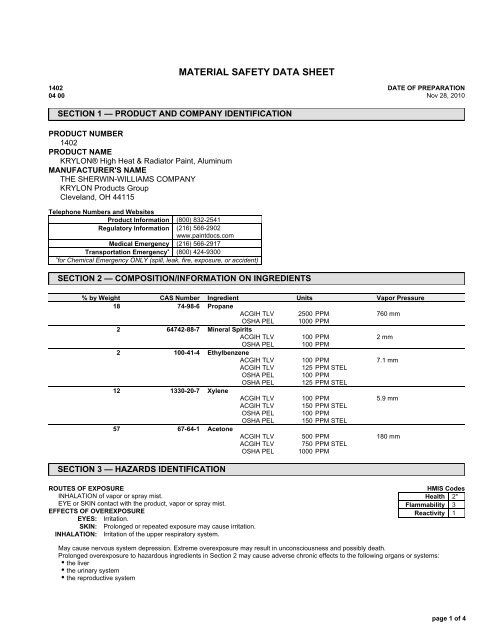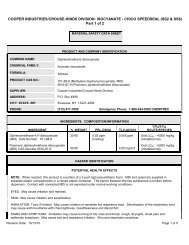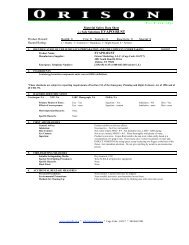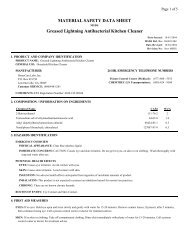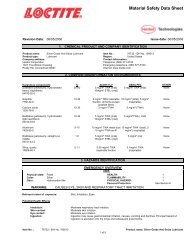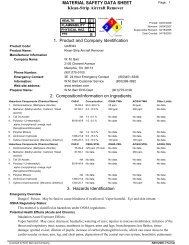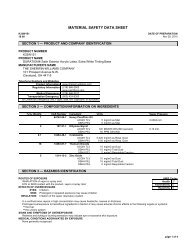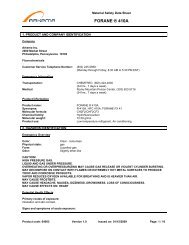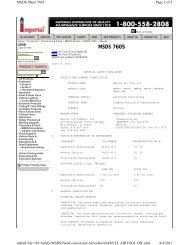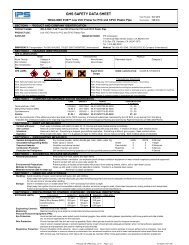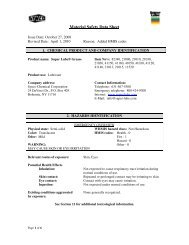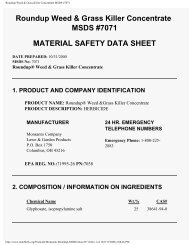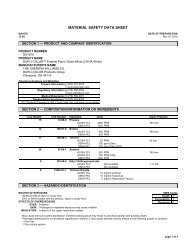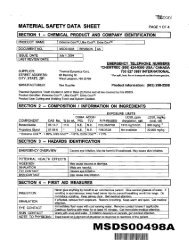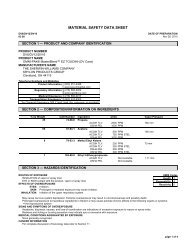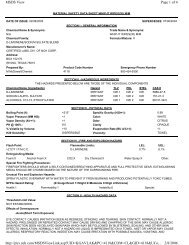sherwin williams krylon high heat & radiator paint aluminum
sherwin williams krylon high heat & radiator paint aluminum
sherwin williams krylon high heat & radiator paint aluminum
You also want an ePaper? Increase the reach of your titles
YUMPU automatically turns print PDFs into web optimized ePapers that Google loves.
MATERIAL SAFETY DATA SHEET140204 00DATE OF PREPARATIONNov 28, 2010SECTION 1 — PRODUCT AND COMPANY IDENTIFICATIONPRODUCT NUMBER1402PRODUCT NAMEKRYLON® High Heat & Radiator Paint, AluminumMANUFACTURER'S NAMETHE SHERWIN-WILLIAMS COMPANYKRYLON Products GroupCleveland, OH 44115Telephone Numbers and WebsitesProduct Information (800) 832-2541Regulatory Information (216) 566-2902www.<strong>paint</strong>docs.comMedical Emergency (216) 566-2917Transportation Emergency* (800) 424-9300*for Chemical Emergency ONLY (spill, leak, fire, exposure, or accident)SECTION 2 — COMPOSITION/INFORMATION ON INGREDIENTS% by Weight CAS Number Ingredient Units Vapor Pressure18 74-98-6 PropaneACGIH TLV 2500 PPM 760 mmOSHA PEL 1000 PPM2 64742-88-7 Mineral SpiritsACGIH TLV 100 PPM 2 mmOSHA PEL 100 PPM2 100-41-4 EthylbenzeneACGIH TLV 100 PPM 7.1 mmACGIH TLV 125 PPM STELOSHA PEL 100 PPMOSHA PEL 125 PPM STEL12 1330-20-7 XyleneACGIH TLV 100 PPM 5.9 mmACGIH TLV 150 PPM STELOSHA PEL 100 PPMOSHA PEL 150 PPM STEL57 67-64-1 AcetoneACGIH TLV 500 PPM 180 mmACGIH TLV 750 PPM STELOSHA PEL 1000 PPMSECTION 3 — HAZARDS IDENTIFICATIONROUTES OF EXPOSUREINHALATION of vapor or spray mist.EYE or SKIN contact with the product, vapor or spray mist.EFFECTS OF OVEREXPOSUREEYES: Irritation.SKIN: Prolonged or repeated exposure may cause irritation.INHALATION: Irritation of the upper respiratory system.HMIS CodesHealth 2*Flammability 3Reactivity 1May cause nervous system depression. Extreme overexposure may result in unconsciousness and possibly death.Prolonged overexposure to hazardous ingredients in Section 2 may cause adverse chronic effects to the following organs or systems:the liverthe urinary systemthe reproductive systempage 1 of 4
1402SIGNS AND SYMPTOMS OF OVEREXPOSUREHeadache, dizziness, nausea, and loss of coordination are indications of excessive exposure to vapors or spray mists.Redness and itching or burning sensation may indicate eye or excessive skin exposure.MEDICAL CONDITIONS AGGRAVATED BY EXPOSURENone generally recognized.CANCER INFORMATIONFor complete discussion of toxicology data refer to Section 11.SECTION 4 — FIRST AID MEASURESEYES:SKIN:INHALATION:INGESTION:Flush eyes with large amounts of water for 15 minutes. Get medical attention.Wash affected area thoroughly with soap and water.Remove contaminated clothing and launder before re-use.If affected, remove from exposure. Restore breathing. Keep warm and quiet.Do not induce vomiting. Get medical attention immediately.SECTION 5 — FIRE FIGHTING MEASURESFLASH POINTLEL UEL EXTINGUISHING MEDIAPropellant < 0 °F1.012.8 Carbon Dioxide, Dry Chemical, FoamUNUSUAL FIRE AND EXPLOSION HAZARDSContainers may explode when exposed to extreme <strong>heat</strong>.Application to hot surfaces requires special precautions.During emergency conditions overexposure to decomposition products may cause a health hazard. Symptoms may not be immediatelyapparent. Obtain medical attention.SPECIAL FIRE FIGHTING PROCEDURESFull protective equipment including self-contained breathing apparatus should be used.Water spray may be ineffective. If water is used, fog nozzles are preferable. Water may be used to cool closed containers to prevent pressurebuild-up and possible autoignition or explosion when exposed to extreme <strong>heat</strong>.SECTION 6 — ACCIDENTAL RELEASE MEASURESSTEPS TO BE TAKEN IN CASE MATERIAL IS RELEASED OR SPILLEDRemove all sources of ignition. Ventilate the area.Remove with inert absorbent.SECTION 7 — HANDLING AND STORAGESTORAGE CATEGORYNot AvailablePRECAUTIONS TO BE TAKEN IN HANDLING AND STORAGEKeep away from <strong>heat</strong>, sparks, and open flame. Vapors will accumulate readily and may ignite explosively.During use and until all vapors are gone: Keep area ventilated - Do not smoke - Extinguish all flames, pilot lights, and <strong>heat</strong>ers - Turn offstoves, electric tools and appliances, and any other sources of ignition.Consult NFPA Code. Use approved Bonding and Grounding procedures.Contents under pressure. Do not puncture, incinerate, or expose to temperature above 120F. Heat from sunlight, <strong>radiator</strong>s, stoves, hot water,and other <strong>heat</strong> sources could cause container to burst. Do not take internally. Keep out of the reach of children.SECTION 8 — EXPOSURE CONTROLS/PERSONAL PROTECTIONPRECAUTIONS TO BE TAKEN IN USEUse only with adequate ventilation.Avoid contact with skin and eyes. Avoid breathing vapor and spray mist.Wash hands after using.This coating may contain materials classified as nuisance particulates (listed "as Dust" in Section 2) which may be present at hazardous levelsonly during sanding or abrading of the dried film. If no specific dusts are listed in Section 2, the applicable limits for nuisance dusts areACGIH TLV 10 mg/m3 (total dust), 3 mg/m3 (respirable fraction), OSHA PEL 15 mg/m3 (total dust), 5 mg/m3 (respirable fraction).VENTILATIONLocal exhaust preferable. General exhaust acceptable if the exposure to materials in Section 2 is maintained below applicable exposure limits.Refer to OSHA Standards 1910.94, 1910.107, 1910.108.RESPIRATORY PROTECTIONIf personal exposure cannot be controlled below applicable limits by ventilation, wear a properly fitted organic vapor/particulate respiratorapproved by NIOSH/MSHA for protection against materials in Section 2.When sanding or abrading the dried film, wear a dust/mist respirator approved by NIOSH/MSHA for dust which may be generated from thisproduct, underlying <strong>paint</strong>, or the abrasive.PROTECTIVE GLOVESNone required for normal application of aerosol products where minimal skin contact is expected. For long or repeated contact, wear chemicalresistant gloves.page 2 of 4
1402EYE PROTECTIONWear safety spectacles with unperforated sideshields.OTHER PRECAUTIONSIntentional misuse by deliberately concentrating and inhaling the contents can be harmful or fatal.SECTION 9 — PHYSICAL AND CHEMICAL PROPERTIESPRODUCT WEIGHT 6.31 lb/gal 755 g/lSPECIFIC GRAVITY 0.76BOILING POINT
1402Do not incinerate. Depressurize container. Dispose of in accordance with Federal, State/Provincial, and Local regulations regarding pollution.SECTION 14 — TRANSPORT INFORMATIONUS Ground (DOT)May be classed as Consumer Commodity, ORM-DUN1950, AEROSOLS, 2.1, LIMITED QUANTITY, (ERG#126)Canada (TDG)May be classed as Consumer Commodity, ORM-DUN1950, AEROSOLS, CLASS 2.1, LIMITED QUANTITY, (ERG#126)IMOMay be shipped as Limited QuantityUN1950, AEROSOLS, CLASS 2.1, LIMITED QUANTITY, EmS F-D, S-U, ADR (D)SECTION 15 — REGULATORY INFORMATIONSARA 313 (40 CFR 372.65C) SUPPLIER NOTIFICATIONCAS No. CHEMICAL/COMPOUND % by WT % Element100-41-4 Ethylbenzene 21330-20-7 Xylene 12CALIFORNIA PROPOSITION 65WARNING: This product contains chemicals known to the State of California to cause cancer and birth defects or other reproductive harm.TSCA CERTIFICATIONAll chemicals in this product are listed, or are exempt from listing, on the TSCA Inventory.SECTION 16 — OTHER INFORMATIONThis product has been classified in accordance with the hazard criteria of the Canadian Controlled Products Regulations (CPR) and theMSDS contains all of the information required by the CPR.The above information pertains to this product as currently formulated, and is based on the information available at this time. Addition of reducers or otheradditives to this product may substantially alter the composition and hazards of the product. Since conditions of use are outside our control, we make nowarranties, express or implied, and assume no liability in connection with any use of this information.page 4 of 4


